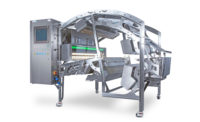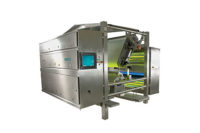Pinguin Foods delivers fresh to frozen in 150 minutes using Bühler optical sorting technology

The increasing demand for fresh to frozen presents a major logistical challenge in getting legumes from the field to the freezer in such a tight time span. That’s why the UK-based frozen vegetable processor Pinguin Foods pledges to achieve this in under 150 minutes. Doing so requires the process to be managed with military precision and split second timing.
The Bühler Group, a Minneapolis-based global supplier of optical sorting solutions, is instrumental in helping Pinguin achieve its key performance indicator of delivering fresh-to-frozen peas in just 150 minutes from its 28-acre site in Kings Lynn, Norfolk. Bühler also helps to streamline the production process by ensuring that all foreign materials and defective products are quickly and efficiently removed, while ensuring the peas are as fresh as possible at the point of freezing.
“Previously, the sorters used at the plant were only capable of a rejection rate of 15 good to one bad from the reject stream,”says Neil Winner, Pinguin’s operations director. “Today, our range of Bühler SORTEX optical sorters is operating at three to one, which gives us incredible cost benefits on yield. Our investment in Bühler technology has ensured all of our product is efficiently and effectively sorted.”
SORTEX optical sorters are designed to be used on production or packing lines, scanning and analyzing the product. Using high-definition cameras, broad spectrum lighting and infrared technology, they can also detect and remove product with color defects or blemishes, as well as foreign objects.
“Our technology is not only looking for any color or shape defects,” says David McCambridge, applications specialist at Buhler Sortex Ltd. “By using profile shape recognition, color detection and enhanced InGaAs camera technology, we can simultaneously remove foreign materials such as insects, wood, glass, stones, seeds or flower heads as well as snails, slugs and any other material [that] will render the product unacceptable. In addition, the optical sorters remove any EVM (extraneous vegetable matter) whether or not it is derived from the pea plant.”
The technology—high-resolution cameras with optical sensors—also enables Pinguin Foods to handle product with very subtle color defects, while the SORTEX E range also uses InGaAs technology to detect a wider range of contaminants and stray fragments of common packaging materials. Existing technologies often found it difficult to distinguish foreign objects from product, for example fragments of light wood from potato or cauliflower, cardboard from carrot and some clear and colored plastics from vegetable mixes. Bühler’s InGaAs technology was developed to identify these difficult-to-detect contaminants and work seamlessly with the SORTEX E at the end of a packing line to perform a final quality check.
Bühler’s PROfile technology also provides Pinguin Foods with an advanced shape detection system, which detects and separates touching objects, allowing for higher capacity shape sorting. In addition, the customized high-response ejector is designed with a long life span, capable of working at high speeds with high-capacity intakes. The sorters are controlled by a large, color touch-screen, making the equipment easy to operate.
Plus, the open design of the sorters makes them easy to clean, ensuring scrupulous sanitation levels are maintained.
“Bühler’s optical sorters are just one part of an extremely intensive process that enables us to deliver the peas from the field to the bag in 150 minutes. It’s a tight schedule with the pea harvest only lasting between 6-8 weeks of the year, starting in mid-June through to August,” says Winner.
The peas are harvested by Holbeach Marsh Co-operative Ltd (HMC), a UK-based co-operative comprised of around 30 member growers who produce vining peas for freezing, all within 25 miles of Pinguin’s Kings Lynn plant.
Picked by the latest-generation of Scania-powered pea harvesting machines, the peas are picked and immediately transported to the Pinguin factory, where they are first subjected to a tenderness test using a tenderometer scale, as approved by Campden BRI.
Only the sweetest, most tender peas are graded AA and earmarked for the supermarkets’ premium ranges. These account for around 65% of the crop. Once quality is assessed, the peas are mechanically cleaned, removing any dirt, debris, stones and stray pods. They are then blanched for 60-90 seconds to deactivate the enzymes that decompose vitamin C and other nutrients causing flavor and color changes.
The peas are then individually-quick frozen, in which they are subjected to -40°C temperatures to ensure cell structure and flavor remain intact. After freezing, they are sorted using seven of Bühler’s SORTEX E1D optical sorters, weighed and put into bulk-store freezers.
Before packaging, four Bühler SORTEX optical sorters work simultaneously to provide a final quality check for impurities such as fragments of cardboard, wood and plastics from pallets, plastic tags and packaging. The peas are then sent to a central distribution depot in Wisbech, from where they are dispatched to Pinguin’s customers around the country.
“This year, the crop is looking good, with an expected total volume of 44,000 tons harvested from the highly fertile East Anglian Fen land,” Winner adds. “Using Bühler’s optical sorters allows us to make the most of this harvest—removing all foreign materials and other contaminants. We’ve increased the amount of good product sorted, which has resulted in less complaints from consumers, and in turn, suppliers. Complaints are costly, so this is not only improving our reputation, but [also] ensuring that we deliver the best product every time.”
Looking for a reprint of this article?
From high-res PDFs to custom plaques, order your copy today!






